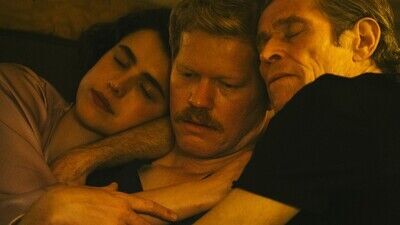It didn’t take all that long to feel like we could cut to the chase quickly. He gives you a lot of space, and then he’ll also give you specific, easily digestible notes. It’s hard to articulate, but even with [my character] Robert, who is being so controlled by Raymond in every aspect of his life, it was, oddly, such a freeing experience as an actor.
How does he give notes? What are those conversations on set?
Yorgos is his own unique breed. What was intimidating in the beginning was that, because the script is so open to interpretation, [there’s] this catch-22: It requires you to make choices and bring your interpretation to it, but it also requires that you don’t get at all locked into that because, with every scene, there are a number of doors you could walk into it from.
There is a human aspect where you want to know, “Okay, we’re somewhere near the same page here, and this is somewhat resembling feeling like something that feels right to you.” But once that trust is there, you don’t need to say as much—you just kind of tell. But yeah, it’s always a process of—what do they say?—fucking around and finding out. [Laughs]
You’re known for your dramatic performances, but people love you in “Game Night,” which was a great change-of-pace comedic role.
I would love to find another comedy in the “Game Night” realm or some great character in a comedy. But I guess anything that I’ve done that’s at all comedic, I would say for the most part, unless you’re playing a comedian, it’s not necessarily funny to [the character]. I got to play this comedic sidekick in “Friday Night Lights,” and what was funny about him was just his very resolute convictions and opinions that were insane. But he fully believed them—and same with Gary from “Game Night.” What a very lonely man. [Laughs]
Lanthimos’ films are dark but they’re also very funny. With “Kinds of Kindness,” how much were you all thinking about the humor in these surreal scenarios?
Sometimes you rehearse something, and in the moment, a line strikes you as funny in a way that it hadn’t before—or other people laugh at the circumstances. But the type of comedic performances that I like all have to do with character and circumstances.
With [“Kinds of Kindness”], Yorgos kept insisting that this was a dark comedy, and for a while, I was like, [skeptical] “Okay…” [Laughs] And then, as we went on, especially with Robert in his desperation, I could start to see how there’s some humor there—and [with] Daniel’s delusion but absolute certainty. So, yeah, I guess some part of you knows that there’s [comedic] potential for it, but then you try to block that out. You can always tell when someone’s trying to be funny—sometimes it works, and they are. But I don’t know if I’m good at that type of comedy.

